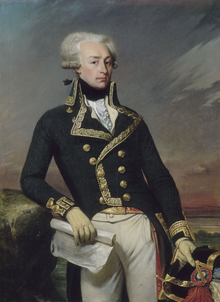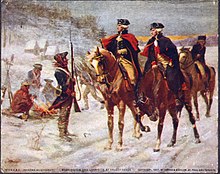I read, I study, I examine, I listen, I reflect, and out of all of this I try to form an idea into which I put as much common sense as I can.
~ Gilbert du Motier, Marquis de Lafayette (wiki) (letter to his father-in-law, the Duc d'Ayan, 4 December 1776)
 |
| Lafayette as a Lieutenant General, in 1791. Portrait by Joseph-Désiré Court |
Humanity has won its battle. Liberty now has a country.
~ Lafayette (variously attributed, after Yorktown)
When the government violates the people's rights, insurrection is, for the people and for each portion of the people, the most sacred of the rights and the most indispensable of duties.
~ Lafayette (speech to the Constituent Assembly, Paris, 20 February 1790)
He devoted himself, his life, his fortune, his hereditary honors, his towering ambition, his splendid hopes, all to the cause of liberty. He came to another hemisphere to defend her. He became one of the most effective champions of our Independence; but, that once achieved, he returned to his own country, and thenceforward took no part in the controversies which have divided us.
~ John Quincy Adams (wiki) (1767-1848) (of Lafayette, address to the U.S. Congress, 31 December 1834)
It's the anniversary of the birth of French patriot Gilbert du Motier, Marquis de Lafayette (wiki) (1757-1834), who fought in both the American and French revolutions. Born Marie-Joseph-Paul-Yves-Roch-Gilbert du Motier to a noble family of the Auvergne, Lafayette entered the French army, but inspired by the ideals of American fight for independence from Britain, he decamped to America and offered his services to the Continental Congress. He became a close friend of George Washington and served the Americans - without pay - as both a general and a diplomat.
 |
| John Ward Dunsmore's depiction of Lafayette (right) and Washington at Valley Forge |
Early in the Revolution, he participated in the battles of Brandywine and Monmouth and in the expeditions against Canada and Rhode Island. Later, he was given responsibility for the defense of Virginia and played a prominent role at Yorktown. Returning to France, Lafayette became involved in the French Revolution - eventually commanding the National Guard - until during the Terror he fell out of favor with the Jacobins, who ordered his arrest. Fleeing France in 1792, Lafayette spent the next five years as a political prisoner in Austria and Prussia. Napoleon allowed him to return in France in 1799, and although he lived in retirement during the First Empire, he became active again in French and European politics after the restoration of the Bourbon monarchy.
This 9 minute video entitled Lafayette: Champion of Liberty is a Strange as it Seems short film - part of a series of produced by Universal in the 1930's.
Based on Ed's Quotation of the Day, only available via email. If you wish to be added to his list, leave your email address in the comments.
This documentary on Lafayette is worth watching: http://www.youtube.com/watch?v=RN1jrr_CMzM
ReplyDelete